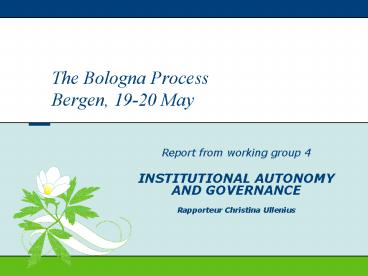Report from working group 4 - PowerPoint PPT Presentation
Title:
Report from working group 4
Description:
How should public responsibility and institutional autonomy be balanced in the ... by the Executive Board instead of the Academic Senate electing a Rector? ... – PowerPoint PPT presentation
Number of Views:14
Avg rating:3.0/5.0
Title: Report from working group 4
1
The Bologna ProcessBergen, 19-20 May
- Report from working group 4
- INSTITUTIONAL AUTONOMY AND GOVERNANCE
- Rapporteur Christina Ullenius
2
How should public responsibility and
institutional autonomy be balanced in the Bologna
Process for optimal co-operation and division of
labour between public authorities and autonomous
institutions?
- Are there elements of institutional autonomy that
are essential to the Bologna Process?
3
Does increasing institutional autonomy imply a
stronger and more centralized institutional
leadership? (Such as the appointment of a
University President by the Executive Board
instead of the Academic Senate electing a
Rector?).
4
Does increasing institutional autonomy imply a
stronger influence from external decision-makers
(ministry of education) on the composition of the
institutional leadership?
- Finally
- Should this theme be brought forward for further
discussion in the Bologna process after Bergen?
5
Autonomy - accountability
- Autonomy defined within a legal framework
- Higher education institutions accountable to
society at large - Governments accountable to HEI for providing the
necessary means to achieve Bologna objectives
6
The necessary means to obtain Bologna objectives
- A legal framework and financial means
- Trends IV identifies national level regulation
that interferes with or restricts implementation
of change - Creative HEIs in a decentralised system
contribute best to Bologna objectives mobility,
compatibility, comparability. - How do we prove that we do the job better if we
have autonomy on some issues?
7
The necessary means to obtain Bologna objectives
to be granted to HEI
- A legal framework formal autonomy
- Academic autonomy curricula, programs
- Financial autonomy to prioritise
- Admission of students
- Recruitment, selection and management of staff
- Internal structure, governing bodies, etc
8
The necessary means to obtain Bologna objectives
- governments
- A legal framework
- State regulated degree structure
- Standardised credit system, e.g. ECTS
- Student support
9
Guiding principles
- Governance should be developed in balance with
cultural framework - Grant student participation
- Transparent decision-making structures
- Interaction with stake-holders
- Improved managerial skills in HEI leadership
- Avoid overregulation
10
ConclusionsThere are issues to be brought
forward in the Bologna process
- Best practice in governance?Change is necessary
- Remove legal obstacles to change and creativity
- Focus on QA, outcomes
- Trust in institutions to take charge of
implementation of the Bologna process































